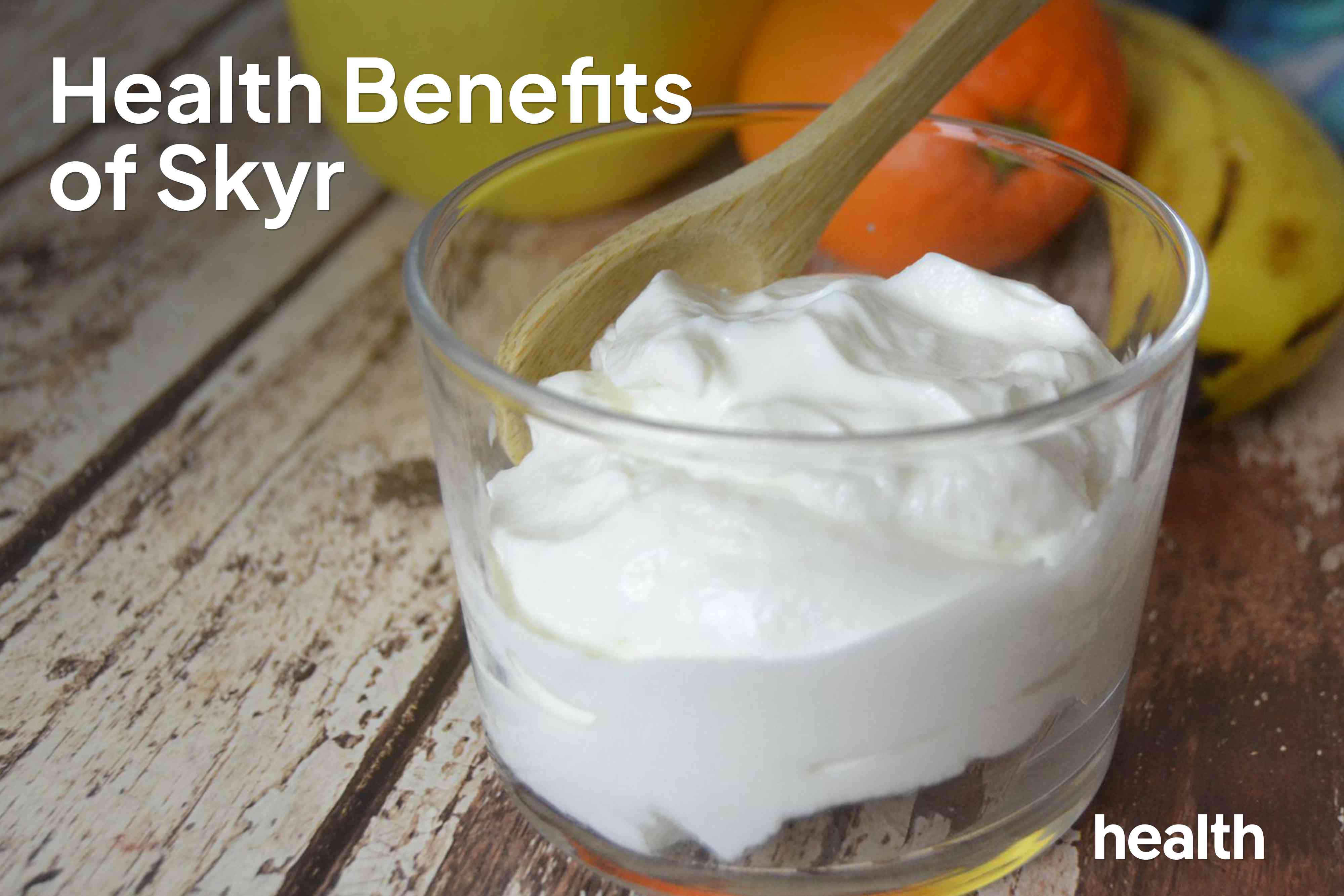Skyr: Benefits, Nutrition, and Risks

Skyr is a type of strained Icelandic yogurt traditionally made using skim milk. It has a thick and creamy consistency, which sets it apart from regular, unstrained yogurt. It’s also higher in protein than regular yogurt and provides a number of essential nutrients, like calcium.
Adding skyr to your diet could help you increase your nutrient intake, protect your bone health, support satiety and blood sugar regulation, and promote a healthy gut.
Design by Health / Getty Images
Strained yogurts, like Greek yogurt and Skyr, are higher in protein than unstrained yogurt. One cup of Skyr contains 20 grams (g) of protein, while the same serving of regular yogurt provides just 12.9 g.
Getting enough protein in your diet is essential to health. Proteins provide the amino acids necessary for critical functions such as muscle growth, immune function, and hormone production.
High-protein diets have also been linked to weight loss, better blood sugar regulation, and a lower risk of bone conditions like osteoporosis. Choosing Skyr over regular, unstrained yogurt can increase your protein intake, which could help you reach your health goals.
Skyr is also packed with vitamins and minerals, like calcium, which is essential for bone and heart health. A one-cup serving of Skyr contains 191 milligrams (mg) of calcium, or 15% of the Daily Value (DV).
Though nutrition details of Skyr are limited, all yogurts made from dairy are rich in other vitamins and minerals, including B12, vitamin A, and selenium. Research suggests that people who regularly consume yogurt, like Skyr, have higher intakes of several nutrients, such as calcium, vitamin D, magnesium, and potassium, compared to people who don’t.
If you’re trying to lose weight or gain muscle mass, Skyr makes an excellent snack or meal option. Skyr is high in protein, which can help you reach and maintain a healthy body weight and pack on muscle.
Protein enhances feelings of fullness after eating by slowing digestion and stimulating the release of satiety hormones such as peptide YY (PYY) and cholecystokinin (CCK), which signal to your brain that you’ve taken in enough calories.
Though there’s no research on the effects of eating Skyr on body weight, yogurt, in general, has been shown to positively influence weight loss and body composition. For example, studies show that adults and children who eat yogurt weigh less, have smaller waist circumferences, and are less likely to have have obesity than those who don’t.
Eating Skyr can also increase muscle mass and strength by boosting protein intake, which is necessary for muscle health maintenance. Choosing high-protein yogurts, like Skyr, may be particularly beneficial for those engaging in resistance training to improve muscle growth.
A study of 30 older men found that the participants who consumed 200 g of Skyr, which contained 18 g of protein, immediately after resistance training three times per week for eight weeks experienced significant improvements in muscle mass and muscle strength compared to the men who took a placebo.
Skyr and other yogurts provide various nutrients that keep your bones strong and resistant to fractures. For example, yogurts, like Skyr and Greek yogurt, are rich in protein and calcium, which are required for healthy bones.
Eating more yogurt might be an effective way to boost bone mineral density, a medical term for the amount of minerals contained within a certain amount of bone, and reduce the risk of bone diseases, like osteopenia, or low bone mass, and osteoporosis, a condition characterized by weak and brittle bones.
Regular yogurt intake has been linked to a lower risk of hip fracture in postmenopausal women and a lower risk of osteopenia and osteoporosis in older adults. For example, a study that included data on 4,310 older adults found that each unit increase in yogurt intake was associated with a 31% lower risk of osteopenia and a 39% lower risk of osteoporosis in females and a 52% lower risk of osteoporosis in males.
Research also suggests that eating dairy products, like Skyr, can improve bone mineral density in children and teens, which can protect them from developing bone conditions and experiencing fractures later in life.
Skyr products contain live and active cultures, which means they’re a good source of probiotics that support gut health.
Probiotics are live microorganisms that reside in the digestive tract and are also naturally found in certain foods, like yogurt. Probiotic-rich foods, like yogurt, can encourage a balanced gut environment by boosting the number of friendly bacteria in the digestive system.
Yogurts, like Skyr, are fermented with strains of bacteria such as Streptococcus thermophilus and Bifidobacterium animalis subsp. lactis., which can accumulate in the gut and offer health benefits. For example, studies show that people who eat yogurt-rich diets have higher levels of these and other probiotic bacteria and increased microbial diversity, or the number of different species of microorganisms in the gut, which is a sign of good overall gut health.
One study found that women who were considered overweight or obese who consumed Skyr daily for four months experienced significant increases in the abundance of S. thermophilus and L. bulgaricus in their poop compared to women who didn’t consume Skyr. This suggests that eating Skyr can increase levels of certain probiotics in the gut.
Additionally, research findings suggest that yogurt consumption can reduce pathogenic bacteria strains, like Bacteroides fragilis, which is associated with gut conditions such as inflammatory bowel disease (IBD) and colorectal cancer (cancer of the large intestine or rectum).
If you’re looking for blood sugar-friendly protein sources to add to your diet, Skyr can be a good option. Because of its high protein content, Skyr helps slow digestion, which also slows the release of sugar into the bloodstream, helping reduce post-meal blood sugar levels.
In addition to protein, Skyr is high in probiotics, which can support the growth of beneficial bacteria in the digestive system. Dysbiosis, the medical term for an imbalanced gut, is thought to be a main driver behind diabetes development. Studies show that adding food rich in probiotics can improve gut health, which leads to better blood sugar control.
A study of 72 people with type 2 diabetes found that participants who consumed 200 g of probiotic yogurt containing Lactobacillus acidophilus and Bifidobacterium lactis probiotics per day for 12 weeks experienced significant reductions in hemoglobin A1c (HbA1c), a long-term marker of blood sugar control.
Though unsweetened Skyr with live and active cultures is a healthy choice for those with high blood sugar, it’s best to avoid sweetened Skyr. Sweetened yogurt can contain a large amount of added sugar, which can negatively affect glycemic control.
Skyr is a good source of protein and several vitamins and minerals. Here’s the nutrition breakdown for a cup of plain Skyr made with skim milk:
- Calories: 109
- Protein: 20 grams (g)
- Fat: 0 g
- Carbs: 5.99 g
- Calcium: 191 mg, or 15% of the Daily Value (DV)
Skyr is rich in protein but low in calories and fat-free. It’s a good source of calcium, which is essential for bone health, blood vessel contraction and dilation, nerve transmission, muscle function, blood clotting, and hormone secretion.
Dairy products, like Skyr, are the main source of calcium in most diets. The calcium in dairy products is much more bioavailable to the body than calcium found in plant-based foods like leafy greens. For example, the absorption rate for calcium in yogurt is around 30%, while the calcium found in spinach has a 5% absorption rate. This makes dairy products, like Skyr, an excellent source of calcium for people with increased calcium needs, like those with osteoporosis.
Though the nutrition information for Skyr is limited, all dairy products, including yogurt, are rich in other vitamins and minerals, such as B12, phosphorus, magnesium, and zinc, all of which play critical roles in health.
Skyr can be enjoyed by most people and isn’t linked to many health risks. However, though some people who are lactose intolerant can tolerate small amounts of fermented dairy products, like Skyr, others with more severe lactose intolerance experience symptoms like gas, bloating, and diarrhea after consuming any dairy products.
If you’re particularly sensitive to lactose, you may have to avoid all dairy products, including fermented dairy products like Skyr.
Also, because Skyr is made from cow’s milk, it’s not appropriate for those following vegan diets and other dairy-free diets, such as paleo diets.
Skyr has a thick and creamy texture and a milder flavor than Greek yogurt. It’s delicious on its own as a snack and can be used in sweet and savory recipes.
Here are a few ways to enjoy Skyr:
- Make a protein-rich breakfast by topping it with nuts and berries
- Use it instead of sour cream in dishes like tacos and burritos
- Try mixing it into soups and chilis to boost their protein intake
- Use it as a base for smoothies and protein shakes
- Use it in place of mayonnaise when making chicken and egg salads
- Add it to homemade salad dressings and dips for a creamy texture
- Mix it into overnight oats and chia pudding
Sky can also be paired with fruit, nuts, and other nutritious foods for a simple snack or quick meal.
Skyr comes in different flavors, but flavored Skyr often contains high amounts of added sugar, which can negatively affect blood sugar regulation, cause cavities, and harm other aspects of health if it’s overconsumed.
Skyr is a creamy, high-protein strained yogurt that may benefit health in several ways.
Regularly consuming Skyr can support the health of your skeletal system and gut and may improve blood sugar regulation and reduce your risk of developing osteoporosis.
Try Skyr in sweet and savory recipes like oatmeal and tacos, or enjoy it on its own when you’re craving a quick and delicious protein-packed snack.





